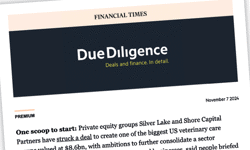What do you know about the Sport? It is interesting, but from my experience, the answer from esteemed colleagues in the newspaper and magazine industry is often a resounding ‘nothing’. Most people probably remember the typical Sport headlines about World War II bombers and the odd bus being found on the moon, but that was 20 years ago. To a large extent, the Daily and Sunday Sport had been flying under the radar, both commercially and generally, and was barely visible to most of us in the newspaper and magazine circulation industry. As for the public, well, the feeling was that they didn’t know much and could care even less. Was the Sport to crash and burn as another casualty of the fickle UK newspaper industry after having had a fair innings over the past 20 years?
All came to a head during the summer of 2007 when it was reported that David Sullivan, along with his partners David and Ralph Gold, had agreed to sell their media creation. A well staged reverse merger was constructed and finally, with a price of £50 million, a deal took place on September 5th 2007. Interactive World, an AIM listed company with connections to the Sport through their technology services, made the move to purchase Sport Newspapers Ltd and to form a new PLC, now known as Sport Media Group.
Was this a high price, or even a sensible decision? Hard to say at the time, but we all know the mind-blowing set-up and brand building costs involved in establishing a new national newspaper in the UK (or anywhere else come to that), from obtaining retail counter display with the nationals, to establishing a brand, and so on. With the company still making a profit from its newspapers in their traditional guise, there was indeed a golden opportunity for the right sort of adventurous team. Not a cert, but a very good bet.
Now came the real challenge!! Fence down but the dog still stands behind where it used to be… Clean sheet of paper and all that… Now that’s scary. Sport Media Group, with its share register consisting of major UK blue chip investment companies, needed things to happen, to happen fast and to establish a clear direction.
Working with a new team of professionals from the core of the UK media world, Andrew Fickling as the newly appointed managing director, himself with a long history at the Sport, oversaw the changes and developments necessary to push the newspaper business forward.
One of the initial moves to improve efficiency was to bring the newspaper business into one location in Manchester. The sales and administration facilities in Leicester, housing the company’s advertising and circulation sales offices, were closed and a new administration and sales department was set up in the old Daily Express listed building in central Manchester. This not only enabled a new dynamic look at the sales process but also created the right newspaper must-have - ‘contact communication’. Clients of mine throughout the world frequently ask the multi-million dollar question - ‘What makes a successful circulation department?’ It is my experienced view that the circulation sales function must be at the heart, the dead centre of the organisation and not on the outside. Newspaper editors should talk to the circulation sales team every day - all the great ones did and still do!! A publisher that has marginalised his circulation presence, and many are doing so in the dream of quick cost savings, has in effect removed his title’s eyes and is flying blind.
Allocation systems… why buy?
Working with their wholesale partners Smith News, Menzies and Dawsons, a new sales team, headed by advertising and circulation sales director Rudd Apsey, embraced the move to centralised efficiencies. He made the progressive decision not to re-invent the wheel, but to build his new sales team utilising the wholesalers’ own supply allocation systems; ie. Smiths News’ Infuse, Menzies’ Net Dataview and Dawsons News’ Xtranet. For the first time, a publisher that works with the wholesalers? Not quite, but trusting wholesale partners and their skills is still a bit ‘off the wall’ in the UK. According to Rudd, it is very clear that ‘it is all about availability’.
Joanne Hollingworth from Smiths News was headhunted to form a new role as wholesale manager giving a focus to the team’s ability to use wholesale sales data and create clear guidelines. Yes, and even try to sell newspapers.
ABC recognition
Something that is imperative for both credibility and transparency is of course ABC status. To a certain extent, due to the fact that very little non-adult advertising was forthcoming, there was little need to provide audited numbers as most advertising taken at the time was in the direct-response adult sector, and advertisers were readily able to accurately measure effectiveness. Working with their advisers, the new management team have now put into action the plans and procedures to achieve full ABC status during 2008.
In terms of numbers and readers, what effect has this had? The Daily sells over 100,000 a day at a premium cover price of 50p and the Sunday now sits around 90,000 with little to nil, advertising support. This is of course in the middle of the toughest marketplace for newspapers in the world and against competition who have money to burn on CD promotions and price-cutting. When pushed on their pricing policy, the new management at Sport Media are adamant that they will maintain the premium pricing policy of the Daily Sport against both the market leader the Sun and its closest rival the Star. A brave move indeed, but one that shows great determination.
Reader profile
Who or what is a Sport reader? Do I see some blank expressions perhaps? No, not from the readers but from people within the trade. Not an easy question to answer and too easy to dismiss the readers disparagingly as ASBOs and the dirty mac brigade. Discussions within the trade reveal that there is a clear pattern emerging. Quite simply, Sport readers are someone else’s readers. These are people who buy the Sun, Star or if pushed the Mirror, but then when questioned further, admit that they also read the Sport. The Sport is currently a supplementary extra which the public add to their daily media mix. Classed as ‘A bit of fun’, ‘Something for the lads to pass around the canteen and share together’, in retail terms, it is a lot like a confectionary purchase, impulse is high. Examination of the retail sales patterns show high levels of dual purchase endorsing this theory. To the advertising community and its London based gurus, the Sport readership is established as C2DE male demographic, or as one commentator said to me, ‘the great unwashed’. I say, try calling a cab, having your central heating repaired or build that new extension to your London terrace without this sector, and see who gets dirtiest first. But what does C2DE really stand for in today’s society where a plumber can earn more ready cash than a bank manager… it’s all just code.
In response to any blank expressions, the Sport reader is MALE. Well that’s a start.
The trade challenge
With a history of non-acceptance by sectors of the retail trade, the challenge for Sport Media this year is to educate and dismiss the prejudice of the trade based on outdated attitudes whilst moving forward with new plans. Currently the Sport is distributed and sold through 35,000 retailers, which when looked at sensibly, probably means a total achievable retail number of around 45,000. Who is missing? A lot is historic, but it seems that the supermarkets’ drive to stock news and magazines left the Sport outside in the cold along with the trolleys; the likes of Tesco and Morrisons certainly did. The Co-op have been bold to move first with a clear directive to stock the Sport Group. Also, the newly modernised Somerfield supermarket and forecourt group have given the all clear to move with the times and stock the titles. Leading retail group Martin McColl are also a key trade retail partner who see the benefit of an open mind in terms of modern retailing. Research shows that Sport readers are mobile and working, they drive so they buy petrol, a majority of them eat and drink on the move - in real terms, they are a tremendous asset to early morning trade for all retailers. But again the Sport management optimistically feel that it is an education process that is going to change attitudes rather than forceful negotiations and hard bargaining.
And so to editorial
The search for an editorial adviser and editor in chief who was in tune with the modern readership – the lads market – resulted in the appointment of Loaded founder and ex-owner of Viz, James Brown. With a vast knowledge of the men’s market in magazines, the management team were convinced that he would bring the correct expertise and knowledge needed. His skill set brought not only valuable advice on the direction and content of the newspapers, but also fresh ideas and direction on the recruitment of journalists to reflect the voice of the modern British man. In tune with his brief, the first changes to the editorial structure by James have been to create a weekend team headed by a new editor Nick Appleyard and deputy editor Gary Doran, who both have extensive knowledge of the product’s needs and are internal promotions. Obviously, the Sunday Sport has been the company flagship over the years but has suffered dwindling appeal since its glory years in the 80s when it was selling half a million copies, hence the concentration on refreshing this team.
In terms of promotional activities, the Manchester-based marketing agency Blue Monkey were given the brief (or banana) to increase in-paper and trade promotional activities. Creating trading and promotional partnerships are high on the agenda with innovation being the key. It is my view that UK newspapers are suffering from promotional paralysis and new ideas have to override the CD / DVD circulation crutch. However, I was involved in the Sun’s ‘I got here before the Germans’ beach towel promotion, so what do I know!
In essence, the business team at Sport Media are now firmly established and striving to make the brand name synonymous with all the traditions of tabloid media.
The game is a tough one and the competitors’ pockets are deep. But, with these initiatives and the new line-ups, this could be just the sporting chance needed by Sport Media. It is going to be a very interesting year.
FEATURE
Sporting Chance?
For its new owners, the Sport brand is both its strongest asset and greatest liability. On the hyper competitive UK newsstand, any brand recognition has got to be a strength, yet years of trade hostility to the title mean that the new team have got their work cut out. Dennis Jared looks at how the Sport plans to rise again.










